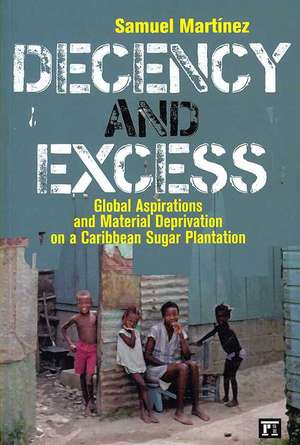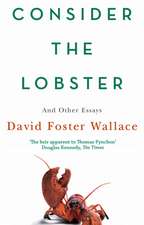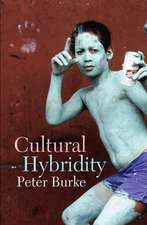Decency and Excess: Global Aspirations and Material Deprivation on a Caribbean Sugar Plantation
Autor Samuel Martinezen Limba Engleză Paperback – 30 oct 2007
| Toate formatele și edițiile | Preț | Express |
|---|---|---|
| Paperback (1) | 456.96 lei 6-8 săpt. | |
| Taylor & Francis – 30 oct 2007 | 456.96 lei 6-8 săpt. | |
| Hardback (1) | 1435.91 lei 6-8 săpt. | |
| Taylor & Francis – 15 mar 2006 | 1435.91 lei 6-8 săpt. |
Preț: 456.96 lei
Preț vechi: 537.60 lei
-15% Nou
Puncte Express: 685
Preț estimativ în valută:
87.44€ • 93.50$ • 72.91£
87.44€ • 93.50$ • 72.91£
Carte tipărită la comandă
Livrare economică 17 aprilie-01 mai
Preluare comenzi: 021 569.72.76
Specificații
ISBN-13: 9781594511882
ISBN-10: 1594511888
Pagini: 242
Dimensiuni: 152 x 229 x 13 mm
Greutate: 0.34 kg
Ediția:1
Editura: Taylor & Francis
Colecția Routledge
Locul publicării:Oxford, United Kingdom
ISBN-10: 1594511888
Pagini: 242
Dimensiuni: 152 x 229 x 13 mm
Greutate: 0.34 kg
Ediția:1
Editura: Taylor & Francis
Colecția Routledge
Locul publicării:Oxford, United Kingdom
Recenzii
“Decency and Excess is a plantation ethnography comparable in terms of richness of observational detail with some of the best examples of this genre. But it also engages a set of concerns that never prominently figured on the agenda of classic Caribbean ethnographies: on the one hand, the study of consumption, and, on the other hand, a theoretical discourse that aims to track the emergence of flourishing local economies of the occult amidst the increasingly ‘occult’ workings of neoliberal global capitalism. Finding an unlikely ally in Georges Bataille, whose theories of expenditure, for Martínez, capture some of the tragic ironies of the consumer cultures developed by the severely exploited and radically impoverished, Martínez traces the contours of a fresh and potentially highly significant critique of capitalism emerging from an unexpected location: that of an eroticization of waste, rather than the fetishization of objectified value. Decency and Excess presents considerable challenges that will be noted not just in Caribbean studies but the anthropology of material culture and consumption, and—one would hope—in the discipline at large.”
—Stephan Palmie, University of Chicago
“In this ethnography Martínez convinces us to care about the fate of Monte Coca, a gritty sugar cane plantation community in the Dominican Republic, a place that no one calls home and that no one will mourn as globalization renders it obsolete. We come to empathize with the cane workers’ struggles for dignity, even though these struggles engender invidious distinctions as much as solidarity, ephemeral relief rather than resistance or hopes for transformation. Finely tuned to meaning and materiality, to everyday practices and global processes, Martínez has made a prescient, masterful case for the return of political economy, back from its banishment to the margins of anthropological theory.”
—Charles R. Hale, President, Latin American Studies Association (May 2006–October 2007) and Professor of Anthropology, University of Texas, Austin
—Stephan Palmie, University of Chicago
“In this ethnography Martínez convinces us to care about the fate of Monte Coca, a gritty sugar cane plantation community in the Dominican Republic, a place that no one calls home and that no one will mourn as globalization renders it obsolete. We come to empathize with the cane workers’ struggles for dignity, even though these struggles engender invidious distinctions as much as solidarity, ephemeral relief rather than resistance or hopes for transformation. Finely tuned to meaning and materiality, to everyday practices and global processes, Martínez has made a prescient, masterful case for the return of political economy, back from its banishment to the margins of anthropological theory.”
—Charles R. Hale, President, Latin American Studies Association (May 2006–October 2007) and Professor of Anthropology, University of Texas, Austin
Cuprins
Chapter 1 Introduction; Chapter 2 A Place No One Calls “Home”; Chapter 3 Living in Nowhere; Chapter 4 Commodity Consumption in a Globalizing Age; Chapter 5 An Indecent Life; Chapter 6 Places and Flows; Chapter 7 High Times in Hard Times; Chapter 8 Material Passions; Chapter 9 The Hot and the Cold; Chapter 10 Conclusions;
Descriere
Studies how sugar plantation workers cope with worsening conditions bought about by neoliberal reforms and low sugar prices.













